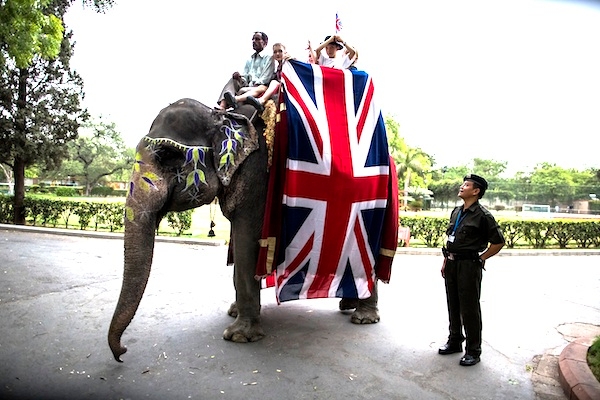Was it the sumptuous leather armchairs? Or the perfect teacups? Or the toothsome selection of custard creams and ginger nuts? I have never sat in a more quintessentially English workplace than the London office of Tata, India’s largest conglomerate.
Travellers to India often remark that many Indians love British culture more than Brits do. Where else do airport bookshops offer tottering towers of P.G. Wodehouse novels? Where else is cricket a multi-billion-pound industry? What few people realise is that cultural bonds have economic consequences. Tata not only has executives who sip tea like English gentlemen. It also owns Tetley tea. Indeed, it is Britain’s largest industrial employer, having also bought — and revived — Jaguar, Land Rover and Corus (the firm that used to be British Steel).
This is good for India. Tata has acquired valuable brands (who outside India drinks Tata tea?) and valuable technology (Land Rovers can cope with awful roads, which is handy in Mumbai). It is good for Britain, too. Tata is investing in steel plants in Yorkshire, car plants in Merseyside and information-technology jobs in Peterborough. It links Britain to one of the world’s fastest-growing economies. And it is one of many: Indian firms invest far more in Britain, relative to the size of its economy, than they do in America.
This is not just because Britain treats foreign investors hospitably. It is also because many Indians have lived in Britain, and feel a personal connection. The new boss of Tata, for example, studied at Imperial College London. Such ties matter. Doing business in a foreign country is much easier if you speak the language, are familiar with the culture and have contacts. This is why, according to Pankaj Ghemawat of the IESE business school, ex-colonies trade 188 per cent more with the countries that colonised them than with other countries.
Indians come to Britain partly because they know other Indians who have done so and enjoyed it. Many stay only for a while, but then move back and forth between the two countries, creating networks that accelerate the flow of ideas from west to east and, increasingly, vice versa.
Consider Devi Shetty, an Indian doctor who trained at Guy’s Hospital in London and then moved back to India. At his hospital in Bangalore, he combines what he learned about heart surgery in Britain with mass-production techniques of the sort you might find in a car factory. Patients are whizzed through operating theatres. Surgeons perform operation after operation, steadily becoming faster and more skilled. Dr Shetty now offers the cheapest heart surgery in the world: less than £1,300 for a bypass. That is barely a tenth of the cost in the West, yet survival rates are equally good.
As Britain ages, could we use a few tips on how to make health care cheaper? Dr Shetty thinks so. He shares ideas with NHS contractors he knows who would like to adapt frugal Indian medicine to British circumstances.
The next wave of technology will come from countries we are used to thinking of as poor and backward. Five sixths of the world’s brains are in emerging markets. Many of the best ones trained in the West and then went home. (I asked the boss of Tata Consulting Services, a giant IT firm, what proportion of his top people had worked or studied abroad. He replied: ‘All of them.’)
Asian boffins are stripping products to their essentials and remaking them much, much cheaper. They are creating £45 fridges, £200 houses and handheld heart scanners for £350. They do this out of necessity, because most Indian and Chinese consumers cannot afford pricey products. But this ‘frugal technology’ would be useful here, too. And it is only the start.
If Britain wants to tap into the dynamism of the emerging world, it needs to keep refreshing its contacts with people from there. That means granting more work visas to people from outside the EU. And when brainy Asians apply to British universities, for heaven’s sake let them in. One day, they may give your kids a job.






Comments